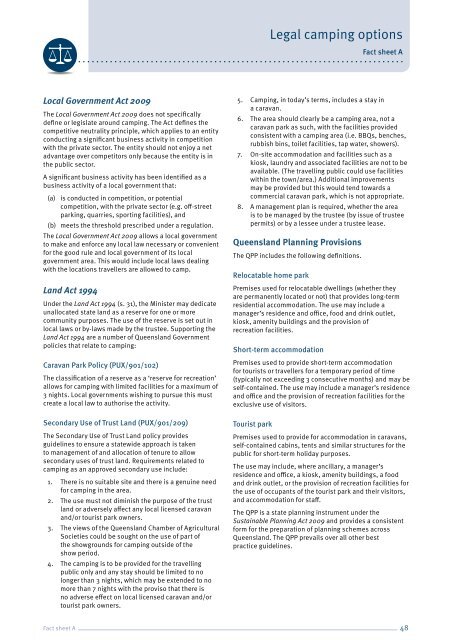qdts-camping-options-toolkit
qdts-camping-options-toolkit
qdts-camping-options-toolkit
You also want an ePaper? Increase the reach of your titles
YUMPU automatically turns print PDFs into web optimized ePapers that Google loves.
Legal <strong>camping</strong> <strong>options</strong><br />
Fact sheet A<br />
Local Government Act 2009<br />
The Local Government Act 2009 does not specifically<br />
define or legislate around <strong>camping</strong>. The Act defines the<br />
competitive neutrality principle, which applies to an entity<br />
conducting a significant business activity in competition<br />
with the private sector. The entity should not enjoy a net<br />
advantage over competitors only because the entity is in<br />
the public sector.<br />
A significant business activity has been identified as a<br />
business activity of a local government that:<br />
(a) is conducted in competition, or potential<br />
competition, with the private sector (e.g. off-street<br />
parking, quarries, sporting facilities), and<br />
(b) meets the threshold prescribed under a regulation.<br />
The Local Government Act 2009 allows a local government<br />
to make and enforce any local law necessary or convenient<br />
for the good rule and local government of its local<br />
government area. This would include local laws dealing<br />
with the locations travellers are allowed to camp.<br />
Land Act 1994<br />
Under the Land Act 1994 (s. 31), the Minister may dedicate<br />
unallocated state land as a reserve for one or more<br />
community purposes. The use of the reserve is set out in<br />
local laws or by-laws made by the trustee. Supporting the<br />
Land Act 1994 are a number of Queensland Government<br />
policies that relate to <strong>camping</strong>:<br />
Caravan Park Policy (PUX/901/102)<br />
The classification of a reserve as a ‘reserve for recreation’<br />
allows for <strong>camping</strong> with limited facilities for a maximum of<br />
3 nights. Local governments wishing to pursue this must<br />
create a local law to authorise the activity.<br />
Secondary Use of Trust Land (PUX/901/209)<br />
The Secondary Use of Trust Land policy provides<br />
guidelines to ensure a statewide approach is taken<br />
to management of and allocation of tenure to allow<br />
secondary uses of trust land. Requirements related to<br />
<strong>camping</strong> as an approved secondary use include:<br />
1. There is no suitable site and there is a genuine need<br />
for <strong>camping</strong> in the area.<br />
2. The use must not diminish the purpose of the trust<br />
land or adversely affect any local licensed caravan<br />
and/or tourist park owners.<br />
3. The views of the Queensland Chamber of Agricultural<br />
Societies could be sought on the use of part of<br />
the showgrounds for <strong>camping</strong> outside of the<br />
show period.<br />
4. The <strong>camping</strong> is to be provided for the travelling<br />
public only and any stay should be limited to no<br />
longer than 3 nights, which may be extended to no<br />
more than 7 nights with the proviso that there is<br />
no adverse effect on local licensed caravan and/or<br />
tourist park owners.<br />
5. Camping, in today’s terms, includes a stay in<br />
a caravan.<br />
6. The area should clearly be a <strong>camping</strong> area, not a<br />
caravan park as such, with the facilities provided<br />
consistent with a <strong>camping</strong> area (i.e. BBQs, benches,<br />
rubbish bins, toilet facilities, tap water, showers).<br />
7. On-site accommodation and facilities such as a<br />
kiosk, laundry and associated facilities are not to be<br />
available. (The travelling public could use facilities<br />
within the town/area.) Additional improvements<br />
may be provided but this would tend towards a<br />
commercial caravan park, which is not appropriate.<br />
8. A management plan is required, whether the area<br />
is to be managed by the trustee (by issue of trustee<br />
permits) or by a lessee under a trustee lease.<br />
Queensland Planning Provisions<br />
The QPP includes the following definitions.<br />
Relocatable home park<br />
Premises used for relocatable dwellings (whether they<br />
are permanently located or not) that provides long-term<br />
residential accommodation. The use may include a<br />
manager’s residence and office, food and drink outlet,<br />
kiosk, amenity buildings and the provision of<br />
recreation facilities.<br />
Short-term accommodation<br />
Premises used to provide short-term accommodation<br />
for tourists or travellers for a temporary period of time<br />
(typically not exceeding 3 consecutive months) and may be<br />
self-contained. The use may include a manager’s residence<br />
and office and the provision of recreation facilities for the<br />
exclusive use of visitors.<br />
Tourist park<br />
Premises used to provide for accommodation in caravans,<br />
self-contained cabins, tents and similar structures for the<br />
public for short-term holiday purposes.<br />
The use may include, where ancillary, a manager’s<br />
residence and office, a kiosk, amenity buildings, a food<br />
and drink outlet, or the provision of recreation facilities for<br />
the use of occupants of the tourist park and their visitors,<br />
and accommodation for staff.<br />
The QPP is a state planning instrument under the<br />
Sustainable Planning Act 2009 and provides a consistent<br />
form for the preparation of planning schemes across<br />
Queensland. The QPP prevails over all other best<br />
practice guidelines.<br />
Fact sheet A 48


